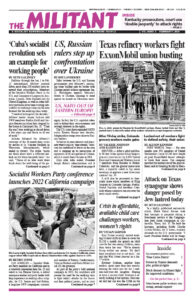In a highly publicized antisemitic attack, Malik Faisal Akram took four hostages at gunpoint during a livestream service at the Congregation Beth Israel synagogue in Colleyville, Texas, Jan. 15. He held the hostages, including Rabbi Charlie Cytron-Walker, for 11 hours, to place demands on the U.S. government. “I know President Biden will do things for the Jews,” he said, adding, “America only cares about Jewish lives.”
Nonetheless, after the hostages escaped and Akram was shot dead by the FBI, Matthew DeSarno, who heads the Dallas FBI field office, tried to explain this away. He told the press the attacker was “singularly focused on one issue, and it was not specifically related to the Jewish community.” Many media in the U.S. carried that line.
After Jewish leaders and others reacted in anger, the FBI had to walk back this claim. They issued a new statement the next day calling it “a terrorism-related matter, in which the Jewish community was targeted.”
Akram, a British citizen of Pakistani descent, chose the synagogue because it is just 23 miles southwest of the federal prison in Fort Worth where Aafia Siddiqui is serving an 86-year sentence. Siddiqui, a Pakistani woman who went to college in the U.S., was found guilty in a trial in New York in 2010 of trying to kill U.S. soldiers in Afghanistan in 2008. She is portrayed as a political prisoner by the government of Pakistan and many Islamist groups around the world.
One thing that is certain is that Siddiqui is a promoter of Jew-hatred. At her trial she demanded the judge submit every juror to genetic testing and bar them if they were Jewish.
Akram repeatedly said he had taken the hostages to win Siddiqui’s release. He spoke twice with Angela Buchdahl, a rabbi at Central Synagogue in New York, acting as if she was a leader of all Jews in the U.S. and had the power to instruct the U.S. government to free Siddiqui.
Cops from several North Texas police departments, SWAT squads, the FBI’s national hostage rescue group and other cop agencies descended on the area after the hostages were taken.
Gulbar Akram, the hostage-taker’s brother who lives in Blackburn, England, tried to get him to lay down his weapons and to surrender during a phone call. “These guys you’ve got there are innocent people,” Gulbar Akram told him. “You don’t need to do this.”
Malik Akram replied that he planned to release them, but added, “I’m coming back home in a body bag.” He had let one hostage go earlier in the day.
When his brother said that there was no way the hostage taking would end in the release of Siddiqui, Akram replied that it didn’t matter. “I’m opening the doors for every youngster to come to America and f–k with them.”
Cytron-Walker told the press he used security training he received following the 2018 massacre at Pittsburgh’s Tree of Life synagogue to keep himself and the others calm, and to look for ways to get out. Working together the hostages inched their way closer to the exit over the course of the day.
According to one of them, Jeffery Cohen, Akram ordered the three to kneel toward the end. When they did not, Akram turned around and put his gun down to pour some soda, Cohen told the Washington Post. That’s when Cytron-Walker threw a chair at Akram and all three ran out of the synagogue.
Moments later FBI agents burst in and killed Akram. He had claimed he had bombs, but there were none.
Jew-hatred conspiracy theories
Akram’s family says he had mental health issues. That may be the case. But the fact he took Jews hostage and espoused Jew-hating conspiracy theories is an indication that antisemitism is growing amid the heightened class tensions of today’s capitalist crisis.
A central element of Jew-hatred is the assertion that Jews secretly control governments, banks, corporations and economic life around the world. This takes the blame off the real source of the exploitation and oppression working people face — the normal functioning of capitalism and the rulers’ drive to maximize profits. Such conspiracy theories have been the stock-in-trade of ultra-rightist and fascist forces — mortal enemies of the working class and its allies — as well as growing numbers of antisemites on the left.
Noting the FBI and most of the press initially refused to call the attack for what it was, Bret Stephens, in the New York Times, pointed out this was “not just a matter of a journalistic lapse,” but “profoundly worrisome.” Many Jews in the U.S. think they are doing well, Stephens noted. But “anyone with a long view of Jewish history should know” how quickly that “can turn to political and personal ruin even — or especially — in countries where it might seem unthinkable.” He noted that the singling out of Israel under the banner of anti-Zionism has come “a more acceptable way” of promoting antisemitism.
“Working people and our unions must speak out against Jew-hatred, wherever it comes from the left or from the right,” said Alyson Kennedy, Socialist Workers Party spokesperson in Texas. “The insidious lies that Jews control the government or are responsible for the evils bred by capitalism must be answered.
“This is a question of life or death for the union movement and the working class. No major section of the ruling class is financing antisemitic groups today,” Kennedy said. “But that will change when the crisis heats up, struggles by workers and farmers accelerate and sections of the ruling class come to fear that growing numbers of working people will seek ways to end capitalist rule. Workers and our unions will have to combat Jew-hatred on the road to bringing to power a government of workers and farmers.”

